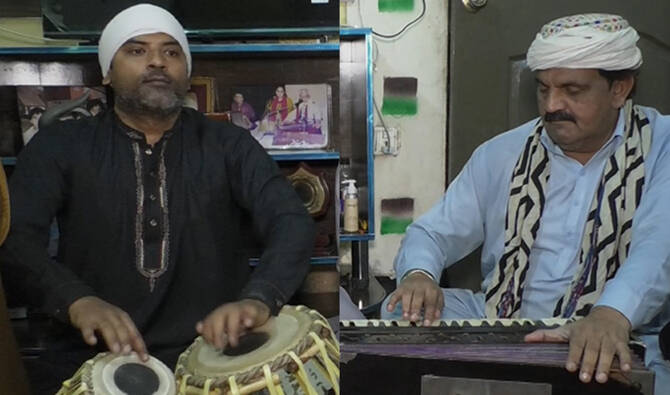LAHORE: Ustad Moeen Ahmed Chand pumped the external bellows of his harmonium with one hand and pressed the keys on the keyboard with the other as he sat on the floor of his small, run-down house nestled in a narrow street in Pakistan’s eastern city of Lahore.
Chand comes from a long line of Rababis, Muslim singers who were the original custodians of Sikhism’s kirtan tradition, a sacred form of devotional music.
Rababis trace their origins to Bhai Mardana (1459-1534), a Muslim musician who was one of the closest companions of Sikhism’s founder Baba Guru Nanak (1469-1539). Mardana traveled across South and Central Asia with Nanak, singing songs of divine wisdom and playing the rabab string instrument from where the Rababi community gets its name, awakening diverse audience with Sikhism’s messages of peace, unity, and oneness.
Over the course of centuries, Rababis have added other instruments such as the tabla and the harmonium to the kirtan tradition, which is passed on from father to son through the generations. Today, it is Chand, 50, who carries forward the art and is fiercely protective of it, struggling to keeping alive the essential but often overlooked part of the history of Sikh and Indian classical music.
Chand, who lives close to Lahore’s iconic Mughal-era Shalimar Gardens, recalled that his love for kirtan took root as a child watching his father laying bricks in the morning and practicing music in the evening.
“Watching them, I also developed a love for it [kirtan], I also took this path,” Chand, 50, told Arab News at his home on Nadeem Street near Lahore’s Malik Park. “I am the 13th generation [of Rababis in my family] … Next in line is my son.”
Before the partition of India and the birth of Pakistan in 1947, Chand’s grandfather was a renowned Rababi at Amritsar’s Golden Temple, one of the holiest sites in Sikhism. Back then, all Rababis used to get stipends from the Golden Temple.
“The temple would send us money and in those days even 200 rupees [$0.72] would amount to Rs25,000 [$90] to Rs30,000 [$108], even Rs100,000 [$360] of today,” Chand said.
But then the family moved to Lahore after the end of British colonial rule and funds from Sikh temples dried up.
“After partition, our elders faced a lot of hardships, worked as laborers, had to work very hard to survive, but with the blessings of Maharaj [Guru Nanak] they never left kirtan,” Chand said.
“NOBODY CALLS US TO PLAY”
Despite his family preserving the kirtan for 13 generations, there is little demand for performances by Rababis now, other than at special events like Guru Nanak’s birth anniversary celebrations. This has forced musicians like Chand to diversify their portfolios, taking up the Sufi devotional music form popularly known as the qawwali, which he performs at seasonal melas and annual events such as annual death anniversary celebrations of Sufi saints of the Indian subcontinent.
“Nobody calls us to play anymore. Once a year tourists come from abroad on Sri Guru Nanak Dev’s birth anniversary, then they call us now and then,” the musician lamented. “All we want is a consistent and reliable source of income.”
Chand’s disciple, his nephew Mohsin Ali Chand, a 32-year-old tabla player, agreed about the lack of respect for the craft and the family that was struggling to carry it forward.
“We are not very respected here [in Pakistan]. In India we are respected,” Mohsin told Arab News as he sat cross-legged at Chand’s house, his fingers softly tapping the top of a pair of tabla drums.
“There people give us a lot of veneration and love and they respect and value us.”
More than the lack of public appreciation, Chand said the commercialization of music had drained the soul of kirtan, and of the Rababis still practicing it.
“My message for my Rababi brothers is that sing kirtan like we recite our holy books,” he said. “Kirtan should come from the heart.”
Chand also warned against imitators of the craft who had “commercialized kirtan. The only way to become a Rababi was to be mentored by another Rababi, the passing down of the skill from an “ustaad” [teacher] to a “shagird” [student], Chand said.
“My only request is to stop lying,” the musician added. “Let the rightful Rababis get the work. Be honest, be truthful, the teacher you’ve learned from, take their name.”


















